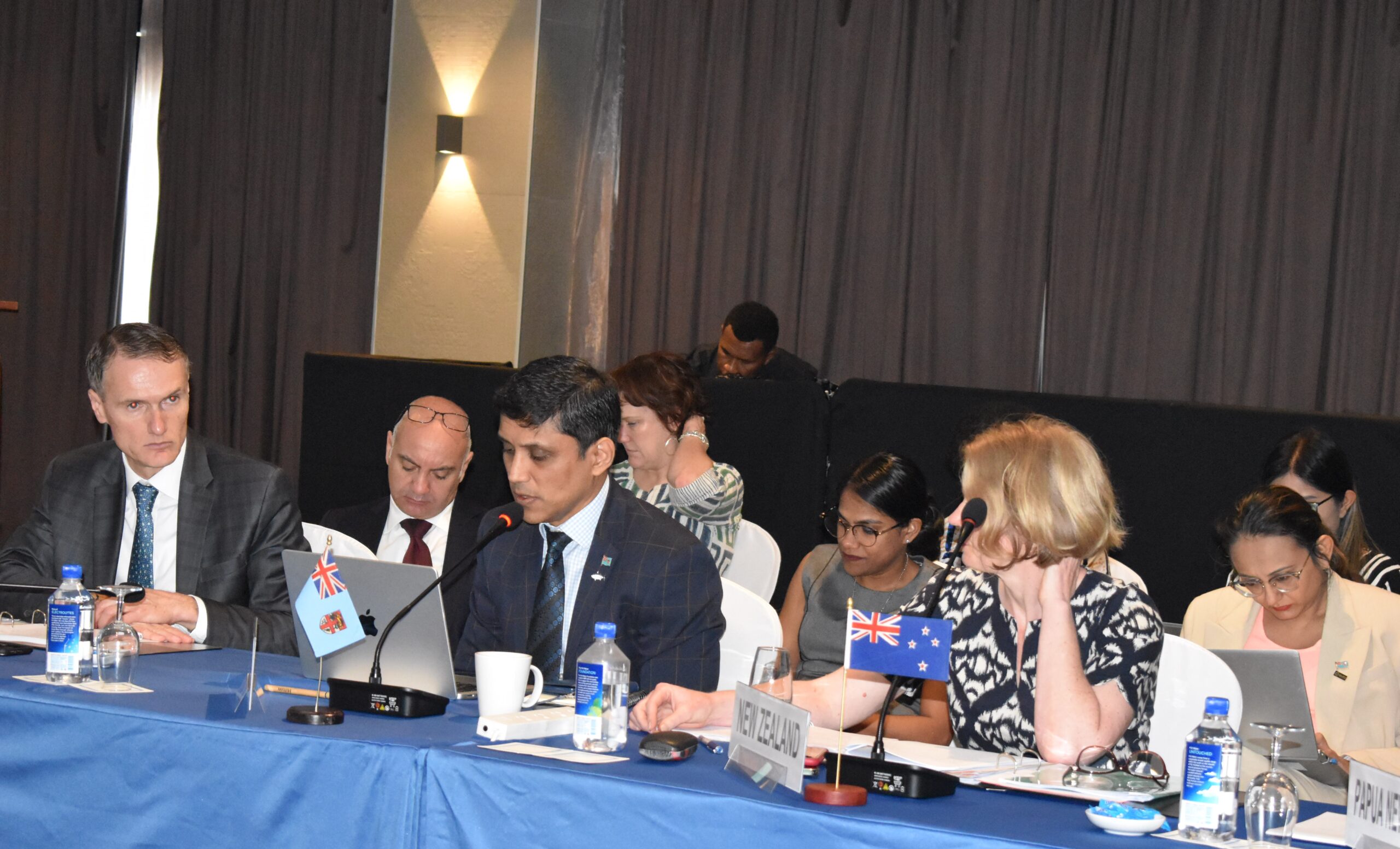Chair,
Hon Ministers, Director General, Excellencies,
Bula Vinaka and good afternoon to you all.
In my capacity as the Permanent Secretary for Tourism, and through my Minister, the Chair, D-G, I hope you have enjoyed that Fijian hospitality so far. Fijians are known to be the happiest people in the world and perhaps, the most resilient, and we hope you got to experience this.
Director-General,
Your journey down from Europe to Asia, and then to the Pacific has provided you with a first-hand experience of how isolated our Region is from the rest of the world. This is the distance we negotiate every time we participate in a global forum, such as the WTO Ministerial Conference.
Chair, Excellencies and Ministers,
If I can be allowed to be frank, we have historically felt that the distance between the WTO and Pacific was equal to the physical distance between Nadi and Geneva.
Your presence today, D-G, in the Pacific, is a testimony to your effort and commitment to bridge this gap. And we very much appreciate that. We also acknowledge being the first being the first region to be visited to be visited. We are ever so grateful.
You would acknowledge more is needed and more can be done. We need more recognition at the WTO Meetings, at the WTO Secretariat, and at the decision-making table. You may note D-G, as the Chair said this morning, the Pacific has the least representation at the WTO Secretariat. We are grouped with other Regions, which has bearing on our ability to access more relevant technical assistance and capacity building.
Chair, Excellencies, the D-G this morning shared with us the constraints in in establishing a Desk for the Region. WWe understand this will be addressed through appropriate mechanisms. But if not a Desk – then maybe a person, from within the organisation that can act as our coordinator. This will certainly help resident and non-resident Forum members equally. Because even those that have Missions in Geneva are thin on the ground.
Chair, Excellencies, Director-General,
Pacific SIDS includes the world’s smallest, most vulnerable and most remote countries in the world. We have a narrow resource base and limited opportunities for diversification. Economies of scale cannot be achieved easily by our small businesses – who are a large part of our Regional economy. Fluctuations in global commodity prices and the high cost of freight leave our profit margins razor-thin and limit our engagement in international trade.
This, coupled with the high occurrence of natural disasters and the severe impact of climate change, continues to continues to cause major developmental challenges for the region.
The outcomes coming out of MC12 does give us hope for a more attuned WTO negotiation.
For example, the partial Agreement on Fisheries Subsidies does provide us with a platform. We, the Members of the WTO, need to start the negotiation process for the comprehensive FSA without any delay.
And I agree with D-G, we also need to show commitment by ratifying the partial agreement as early as possible. We need to show good-faith and so should the major fishing nations. Second wave talks and Ratification – one should not be predicated on the other.
They say, “a society can be judged by the way it treats the most vulnerable”. We need the WTO, and the multilateral trading system, to protect the most vulnerable nations and to not only recognise but provide appropriate rules to support our development.
Chair, Excellencies
Given the high degree of vulnerability, the unique challenges of SIDS need to be recognised in the “new” or renewed WTO (under D-G’s Leadership). This must include technical assistance and capacity building. Tailored assistance needs to be provided that does not categorise us with regions with different needs or may be far ahead of us in terms of needs and resourcing.
The WTO training programmes need to be similarly tailored. The current internship programmes and advanced level training have prerequisites that Pacific officials cannot meet. We in the Pacific have a very small Trade team and there is continuous staff turnover, and this restricts some of us from sending officials for internship programmes or advanced courses. We fail to gain from these opportunities. We need to rethink these programmes for the Pacific – especially the criteria.
Chair, Excellencies,
The WTO is a critical “member-driven” multilateral institution. The organisation needs to ensure that the rules and rule-making process is transparent and inclusive, including negotiation processes and arrangements.
For the Pacific, it is very important that WTO works for all members whether large advanced economies or small developing island states. Hence, the Reforms play a critical role in shaping the WTO and its engagement with the members.
The Dispute Settlement System of the WTO should provide confidence to the SIDS to pursue issues with trading partners. The current process is prohibitively costly and procedurally onerous. This defeats the purpose of a rules-based system.
D-G, we have full faith in you – and we strongly believe that you will begin the process to have our concerns addressed at the WTO.
I wish you an enjoyable stay in Fiji and I look forward to your continued engagement with the Pacific region.
We look forward to more WTO Secretariat visits to the Pacific region.
I thank you Chair for giving me the floor.



